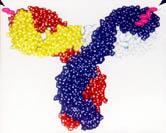|
David W. Scott –
immunologist |
 |
"Scientists often say
"BEAUTIFUL" when they are describing an experimental result. It could be physically beautiful or beautiful in its symmetry or the simple answer it gives." |

|
| |
|
|
|
| |
How were you motivated to become an
immunologist? |
| |
In high school, I became interested in microbiology. I was intrigued
by the variety of organisms that could live on a leaf of grass. I set up "hay
infusions" of straw in plain water and watched with glee as they sprang to life
with single and multicellular organisms (in a smelly soup). When I went off
to college, I wanted to become a chemist, as I thought biology was very descriptive and too imprecise. I was lucky to take a cell biology
course just as the genetic code (of 3-letter words created from the 4 nucleotide
bases) was deciphered. Having a Professor who could impart that excitement was a thrill and convinced me I wanted to be an academic scientist.
As a second-year student, I got a work-study job in an
immunochemistry lab at a university near my home town. Aha:quantitative biology at
last! I was entranced by the SPECIFICITY OF ANTIBODIES for their antigens. At that
time, no one knew that this exquisite specificity resided in the amino acid sequence encoded in the genes, whose code scientists had just
solved. I was amazed that the human body (and higher vertebrates) could respond with
specificity to such a multitude of foreign invaders, even if they were harmless, and yet failed to make an immune response against their own
proteins. This is the cornerstone of Immunology -- self:non-self discrimination or
tolerance -- and a central question that has intrigued me for over 28 years! (I was 19 when I worked in the immunochemistry lab)!
I was enormously lucky to work in the lab of a famous immunochemist
who had trained with the father of antibody specificity. Now I could trace my
scientific lineage all the way back to Paul Ehrlich, the father of immunology. Coupled with the excitement of the 1960s in
immunology, I was fortunate to "grow" up with the field as it matured and went through a
molecular revolution. Immunology still excites me: I now have the opportunity to contribute to solving autoimmune diseases, like MS and
diabetes, creating vaccines for cancer, AIDS and malaria, as well as ameliorating allergies. |
|
 |
| |
|
|
|
| |
What can you share about your creative process? |
| |

|
|
Creativity means different things to different people. It could
connote innovation, but it need not. To a scientist, it could reflect the process
of visualizing a unique approach to answer a daunting question. That is, the design of an experiment per se is a creative process. What
specific question are you asking? What hypothesis are you testing? How would you
ask it? Will the design give you a "yes/no" answer and will it be interpretable if you get an unexpected answer? That is, will it
prove or disprove (better) the hypothesis? Is the experiment well-controlled?
The creative process also involves the experiment itself, the equipment
utilized (sometimes just your hands) and the aesthetics of the results. Look, for example, at the symmetry and irregularity of a DNA sequencing
gel. Peer at a Winogradsky column (of growing colorful colonies of anaerobic
Bacteria). Look at the beauty of cellular structures revealed by electron microscopy or immunofluorescence. Scientists
often say "BEAUTIFUL" when they are describing an experimental result. It
could be physically beautiful or beautiful in its symmetry or the simple answer it
gives.
How does one get creative ideas? I can wake up in the middle of
the night to write down an experiment that came to me while sleeping or trying to
sleep. Something you see when walking in the woods or a thought that comes when driving a freeway. Creative juices often flow at meetings when
scientists gather to present and share their ideas. Sometimes, it is just getting away to new environments, pleasant or unpleasant, that can make
creative juices flow. Sometimes, teaching stirs creativity as students who are new to a field ask questions, out of
naiveté or unburdened by lots of facts. These questions and their excitement stimulate a creative new
approach or idea. That's why I like teaching. I'm always learning from the
students I teach, and the give and take of science is invigorating. |
|
| |
|
|
|
| |
What ideas do you have for a future human community on Mars?
|
| |
Building on the premise that we should be able to transport modular structures that would allow humans (and other animal) to survive in the
atmosphere and extreme temperatures of Mars, I think the major limitation would be renewable sources of food. However, what we eat today and
what we do in 30 years could change dramatically. The first communities would likely include scientists, biologists of many disciplines, chemists,
geologists, physicists, and astronomers, to name a few. They would be doing experiments and gathering data as they explore this planet. But I hope
that the community would also include writers, poets, artists, musicians, as well
as psychologists, sociologists and archeologists. That is, there would be all sorts of creative people, as well as individuals who would
study us!
Obviously, there would need to be a variety of support personnel for the entire infrastructure.
Can a community of humans survive in such an atmosphere for an extended period of time and develop both commerce and living communities? Right
now, this is difficult to envision. However, we had no idea (in 1960) of the potential that
science and technology could have brought in the last 40 years, so we are only limited by our imaginations. It would be nice,
if not downright idealistic, to imagine a socially just and sharing society. Would
the constraints of life in (distant) space possibly drive us to a more ideal society? Good question.
|
|

|
|




